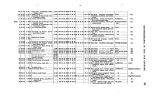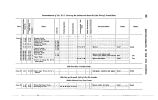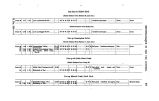| OCR Text |
Show RECONNAISSANCE IN THE UTE COUNTRY. 55 Three miles farther we came to another creek which we followed up' toward. the mountain, to water, wood, and grass, where we proposed to camp. But after waiting till late in the afternoon for our wagon we discovered that it had missed our trail and gone on. There being no water for seventeen miles, and sand a foot deep over a great part of the distance, we knew that a night march was inevitable. As our blankets and rations were all in the wagon and we had eaten nothing since breakfast, and our animals having had several hours rest and grazing, the best thing to be done was to move on. So at 5 p. m. we started. Fortunately for us, there was a moon, and we could follow the road and the track of the wagon very well. But such a road for fifteen miles I never had seen equaled for the depth of sand. We crossed the dry beds of three streams marked by skirting of cot-touwoods in the first five miles, all containing water nearer the mountains. The road then conducted us over a sandy waste by the southwest of the sand- hills mentioned in the reconnaissance to the Musca Pass. About nine miles from the last of the three belts of timber passed we came to a fourth, marking the course of the stream coming out the Musca and Sand- Hill Passes, which unite a mile from Musca Pass and sink at that point, so there was no water where we crossed it some four miles farther out in the valley. After leaving this skirt of timber the road improved a little, sand not quite so deep, and in a couple of miles crossed a brisk- running stream without any timber whatever, aud a mile or two farther found the wagon at a similar stream, where it had • stopped about dark, and where we found it at 10 o'clock p. m., after a most tiresome march of five hours. The two last streams are from the mountains between Musca Pass and Zapato Creek, and sink near the base of the mountains, rising again from three to four miles out from the mountain, to the west of the road from Fort Garland to Musca Pass. September 30.- Determined to go out into the valley to- day and ascertain if there was a lake there, and, if so, how large; so directed camp to be moved about five miles, to the crossing of Zapato Creek, where the road we were traveling intersected the one from Fort Garland to Musca Pass. After riding about five miles out into the valley, a little south of west from our camp, found some marshes and sloughs into which the stream that we camped on and had followed down emptied, and a mile farther south and a little west found the large lake, which is about two miles long and a mile wide. The water in the lake and in all the marshes is very alkaline. From the lake southwest, toward Sterrit's ranch, on the road from Garland to the Rio Grande, is a continuation of sloughs and marshes, as there are also toward the north and northwest, to the siuks of Saguache and San Luis Creeks. Perhaps some information of importance with regard to this valley could be obtained from the plats and maps in the land- office at Pueblo7 and in the office of the surveyor- general of the Territory at Denver. A company enfranchised by the territorial legislature collect tolls aud maintain a good wagon- road over the pass, the principal works having been done on the southern approach. October 1.- Marched to Fort Garland, and, discharging rodmen Pim-per and Mclntyre, await transportation to Pueblo. Very respectfully, your obedient servant, JAMES BASSEL, Second Assistant Engineer. H. G. PROUT, Chief Civil Assistant Engineer, In charge Reconnaissance in Ute Country. |

















































































































